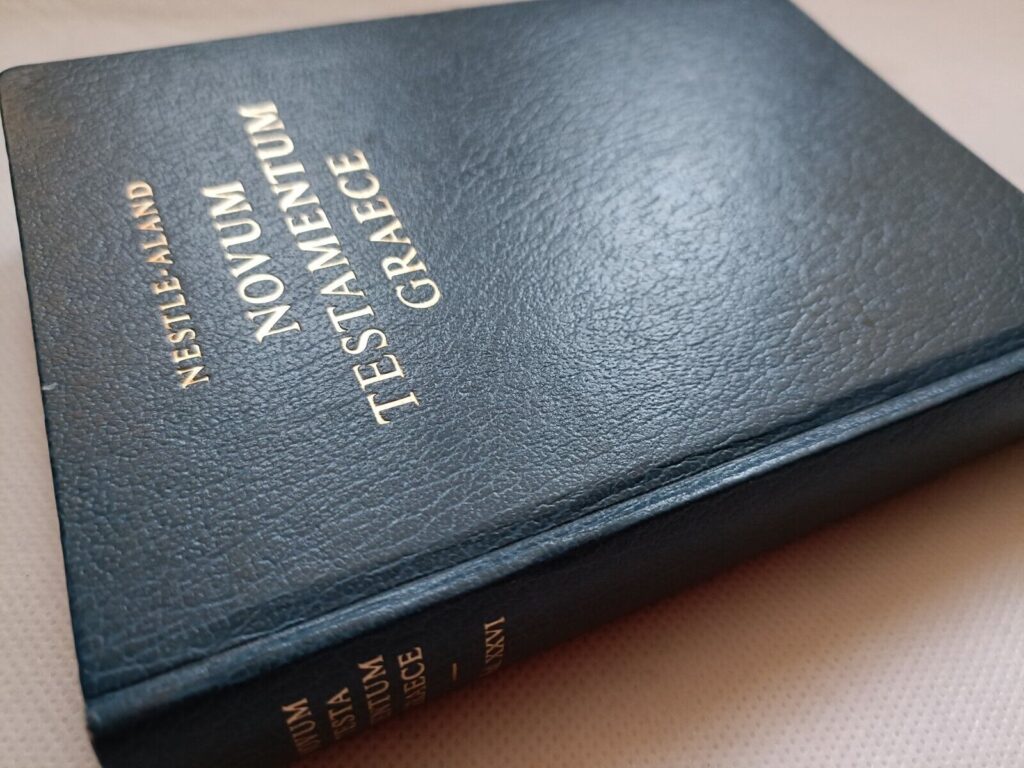In the complex landscape of biblical scholarship and translation, the N0vum Testamentum Graece (New Testament in Greek) otherwise popularly known as the Nestle-Aland Greek New Testament (After its after its most influential editors, Eberhard Nestle and Kurt Aland), stands out as a cornerstone for contemporary biblical research and translation. This revered text, now in its 28th edition (released in 2012), represents a collaboration between the New Testament Textual Research (INTF), the Vatican and the United Bible Societies (UBS) that aims to provide an accurate and reliable Greek text of the New Testament. This scholarly cooperation started in the early 1960s in the 25th edition of the Novum Testamentum Graece and underscores a shared commitment to textual integrity across Christian denominations and has been widely adopted by Bible Societies globally.
However, this edition has not been without controversy. It finds itself at the center of heated debates, particularly from the King James Version (KJV) Only movement. Proponents of this movement assert that the Vatican’s involvement signals a clandestine agenda to undermine Protestant versions of the Bible, and cites several “evidence” that proves that there is a broader conspiracy to dilute the scriptural authority. We will examine the validity of this conspiracy theories while exploring the broader implications of such accusations against modern Bible translations. We will explore both sides of the debate by focusing on one example to demonstrate the line of thinking and way of argumentation of the KJV Only movement and then counter this conspiracy theory.
Claims from the KJV Only Movement
Supporters of the King James Version (KJV) Only movement claim that the Vatican has a hidden agenda. They believe the Vatican wants to undermine the Bible by influencing modern translations. An example of a specific change they point to is the omission of the word “just” in Matthew 27:24. The KJV reads, “I am innocent of the blood of this just person,” whereas many modern translations, read, “I am innocent of this man’s blood.” Older Roman Catholic Bibles like the Douai-Rheims 1582 and the Douay Version 1950, as well as the 1970 St. Joseph New American Bible, include the phrase “I am innocent of the blood of this just person.” In contrast, more modern Roman Catholic versions like the Jerusalem Bible (1968) and the New Jerusalem Bible (1985) omit the word “just” and read similarly to the protestant-evangelical translations. Additionally, the KJV Only movement points to a gradual change among the critical text versions. As an example of this they claim that the Revised Version of 1881 and the ASV of 1901, both based on the Westcott-Hort text, retained the word “just.” However, the RSV of 1946 was the first major Bible translation to omit this word, which set a precedent for later critical text versions to follow suit.
Proponents of this theory argue that the Vatican has conspired for years to undermine the authority of the Scriptures and to deny their inerrancy. They suggest that the Vatican aims to “overthrow the paper pope” (the Bible) of the Protestants by supervising and influencing the critical text used in many modern Bible versions. They assert that this conspiracy is openly acknowledged, but people continue to be blind to it or deliberately deceive others about it.
To further substantiate their claims, KJV Only advocates refer to page 45 of the Nestle-Aland Critical Greek 27th edition, which documents the collaboration between the Vatican and the UBS. They argue that this is undeniable proof that modern translations s are influenced by the Vatican, calling them the new “Vatican Versions.”
Variations even in the earliest manuscript copies
Our earliest copies of Matthew 27:24, Codex Vaticanus and Codex Sinaiticus, both from the mid-4th century, diverge on their readings of this text. The former, which is the basis for most modern translations, reads – ἀθῷος εἰμι ἀπὸ τοῦ αἵματος τούτου (I am innocent of the blood of this man) while the latter, which informs the KJV and other translations, reads – αθωος ειμι απο του αιματος του δικαιουτουτου (I am innocent of the blood of this just man)
Philip Comfort in his Comfort Text Commentary writes, “The WH NU reading could be the result of homoeoteleuton—του δικαιου accidentally being omitted before τουτου. However, it is more likely that the variant reading is a scribal interpolation adapted from Pilate’s wife’s comment about Jesus being a just man (27:19; cf. Luke 23:14 and John 19:6). This bit of gap-filling is important for the narrative of Jesus’ trial because it tells us that Pilate thought Jesus was innocent of the crimes charged against him and even more, that Jesus was a just man. But as WH NU read, it must be inferred that Pilate thought Jesus was innocent or he would not have washed his hands of Jesus’ blood.”
Addressing the Conspiracy Theories
Several arguments counter these conspiracy theories:
1. Lack of Evidence
One of the main arguments against the conspiracy theory is the absence of concrete evidence. There is no verifiable proof that the Roman Catholic Church planted scholars with the intention of corrupting the biblical text. The introduction from the 27th edition of the “Novum Testamentum Graece” (Nestle-Aland) merely states that the Vatican and UBS are collaborating to produce a Greek New Testament. This cooperation aims to address the variations across nearly 5,000 New Testament texts and harmonize approximately 500,000 textual variants. This statement does not constitute evidence of a conspiracy.
Further, focusing on the example mentioned above, it is clear that even our earliest manuscripts, such as Codex Vaticanus and Codex Sinaiticus, show variations in this specific text. Nevertheless, both are utilized by the Novum Testamentum Graece. Furthermore, if there truly were a conspiracy to eliminate references to Jesus as a ‘just man’ as claimed by proponents of the KJV Only movement, then why do modern translations retain such descriptions (of Jesus being righteous, without fault, and without guilt) in passages like Luke 23:19 and John 19:6? Certainly, such a conspiracy theory by the KJV Only Movement, based on this specific example alone, truly makes no sense.
2. The Implausibility of Self-Incrimination
Another point to consider is the implausibility of the Vatican and UBS openly advertising their involvement if their goal were to corrupt the biblical text. If there were a conspiracy to alter scripture, it is unlikely that those involved would publicly acknowledge their participation. This transparency undermines the notion of a secretive plot and suggests that the allegations lack a factual basis.
3. Limited Influence on Modern Translations
It is important to note that the UBS and the Vatican do not control the specific translation choices made by modern Bible translators. While revisions to the “Novum Testamentum Graece” may be made under their supervision, the translators of individual versions have the autonomy to adopt or reject parts of this Greek text. This means that the influence of the UBS and Vatican on the final output of modern translations is limited.
4. Variety of Sources Used by Modern Translations
Not all modern Bible translations rely on the “Novum Testamentum Graece”. For instance, versions like the New King James Version (NKJV), 21st Century King James, King James 2000, and the Holy Bible in Its Original Order do not use this Greek text but uses the Textus Receptus, the same Greek text used by the KJV. Despite this, some advocates of the KJV Only movement reject these translations as well. This suggests that objections may not be solely based on the source text but could involve other factors.
5. Logical Fallacy of Guilt by Association
Finally, the argument that a connection to the Vatican automatically implies corruption is an example of the guilt by association fallacy. Erasmus, a Roman Catholic scholar and priest, whose work was foundational for the KJV translators, did not renounce his Catholic faith. Despite his ties to the Roman Catholic Church, his contributions are accepted by the KJV Only movement. This demonstrates that a Vatican connection does not inherently mean a scholar’s work is corrupt. Evaluations should be based on hard evidence rather than assumptions and logical fallacies.
The accusations of a Vatican-led conspiracy to corrupt modern Bible translations lack credible evidence and logical consistency. The collaboration between the INTF, the Vatican, UBS and other groups aims to ensure accuracy and consistency in the Greek text, not to perpetrate deception. It is essential to critically examine these claims and base our conclusions on hard evidence and facts, rather than on unfounded theories or the extremist conspiracy theories—amounting to nothing more than outright lies—promoted by the KJV Only movement.
Feel free to share your thoughts and continue the discussion in the comments below.
 Hi ! my name is Zigfred Diaz. Thanks for visiting my personal blog ! Never miss a post from this blog. Subscribe to my full feeds for free. Click here to subscribe to zdiaz.com by Email
Hi ! my name is Zigfred Diaz. Thanks for visiting my personal blog ! Never miss a post from this blog. Subscribe to my full feeds for free. Click here to subscribe to zdiaz.com by Email
You may also want to visit my other blogs. Click here to learn more about great travel ideas.


Undeniable Documented Proof the ESV, NIV, NASB, LSB, Holman Standard, NET, Jehovah Witness NWT etc. are the new “Vatican Versions”
http://brandplucked.com/realcatholicbibles.htm
Undeniable Textual Proof the ESV, NIV, LSB, Holman Standard, NET, NASBs, Jehovah Witness NWT are the new “Vatican Versions” Part TWO – Textual proof.
http://brandplucked.com/esvcatholicpart2.htm